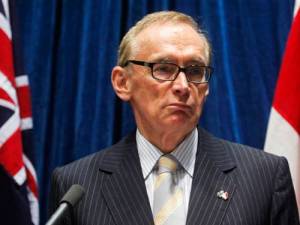Analysis by: Michael Bachelard === Tony Abbott has backed away from his pledge to visit Indonesia in his first week in office but the promise stands to make it his first overseas destination as prime minister.
The meeting of the Asia-Pacific Economic Co-operation forum will be held in Nusa Dua, Bali, early next month, so if he also travels to Jakarta before that, he’ll be going twice to the country in his first month in office. His visit, or visits, will be watched closely.
But without Abbott having lifted a finger, economic circumstances have done him one big favour. In response to a current account scare and the plunge of the rupiah, Indonesia’s new finance manager has removed the quota on beef imports in the name of economic stimulus.
The short-lived Australian ban on live exports in 2011, followed by the nationalistic assertion in Indonesia that it could be self-sufficient in beef by 2014, conspired both to damage the Northern Territory cattle industry and send Indonesian beef prices soaring. Abbott used it ruthlessly to hurt Labor.
Indonesia’s quiet abandonment of that policy during Australia’s election campaign has cleared one issue off the bilateral table but Abbott cannot expect the rest of his demands of Indonesia to be settled so easily.
On asylum seekers particularly, he has raised hackles. His boat-buying policy has been labelled “crazy”, with senior MP Mahfudz Siddiq saying this week that it was clear Abbott “doesn’t understand diplomacy or bilateral co-operation”.
His “turn back the boats” policy is also deeply unpopular right up to the presidential office.
This is a question of sovereignty and national pride on both sides of the ocean.
When Australia’s navy turns the first boat around under Operation Sovereign Borders – and it becomes the responsibility of Indonesia’s anaemic search and rescue capability – or limps back to an already bursting immigration detention system, expect Indonesian civil society and politics to object loudly about Australian chauvinism.
At Abbott’s back, though, are the expectations he himself has raised.
Former Liberal foreign affairs minister Alexander Downer, for example, has argued that Australia should earn respect in Jakarta by muscling up.
“If John Howard had rung me and asked if he should sign a joint communique with Indonesia saying we would never act unilaterally to protect our borders, I would have told him it would be a sell-out of our national interest,” Downer wrote in July. “It would be weak and fawning. You don’t win respect signing documents like that. But that’s hypothetical. Howard, a patriot if ever there were one, wouldn’t have countenanced signing such a document.”
Abbott is known in Indonesia as Howard’s political offspring. That is not an unalloyed positive. Castigated first as George Bush’s “deputy sheriff,” Howard did develop a good relationship with Susilo Bambang Yudhoyono personally, and Indonesia generally, after the first Bali bombing in 2002, sealing it with a billion-dollar donation after the Aceh disaster in 2004. But he is still widely blamed for “masterminding” the separation of East Timor.
Meanwhile, Abbott will turn up in Indonesia promising, for the sake of domestic politics, a huge cut to foreign aid – $4.5 billion out over the next four years. The fact that this is likely to hit Indonesia hardest – it is our biggest aid recipient – has already been noted in Jakarta. A Jakarta Post opinion story on Monday said of aid: “The future looks bleak.”
A wild card in the diplomatic mix is one tiny boat with six people aboard. The Pog, the last vessel of the so-called Freedom Flotilla, set off on Monday morning from far north Queensland en route to West Papua. The Pog carries Amos Wanggai, one of the indigenous Papuan men who deeply disturbed relations between Howard and Indonesia in 2006 by sailing in the opposite direction and successfully seeking asylum in Australia.
West Papua is the poison apple in the bilateral relationship. After that refugee incident, Howard tried to find an antidote with the Lombok treaty of 2006, which guarantees Australian support for Indonesian control over Papua.
However, many Indonesians simply do not believe the words, and think Australia still agitates for the province’s independence, just as it did East Timor’s.
The landing of the Pog, its interception by the Indonesian military, and the possible imprisonment of its sailors may pose an early challenge for Abbott and his likely foreign affairs minister Julie Bishop.
Indonesia’s economy is growing fast. Its military is gearing up. It is flexing its diplomatic muscles as the largest economy in the Association of South East Asian Nations. It is becoming more assertive about its place in the world.
It is also at the end of an electoral cycle. SBY’s term ends next year and he already looks like yesterday’s man. His replacement may not be as sympathetic or measured towards Australia’s needs, and the relationship remains full of potential misunderstandings on both sides.
As prime minister, Abbott cannot any longer pretend that his boats policy is unpopular in Indonesia because Labor spoilt the relationship. He must take responsibility for his own policies and set his own tone with a changing, increasingly confident Indonesia, while projecting an image that allows him to work with whoever replaces SBY.
It’s not an easy task, and it begins soon.
=> Michael Bachelard is Indonesia correspondent for Fairfax Media
Source: The Age



